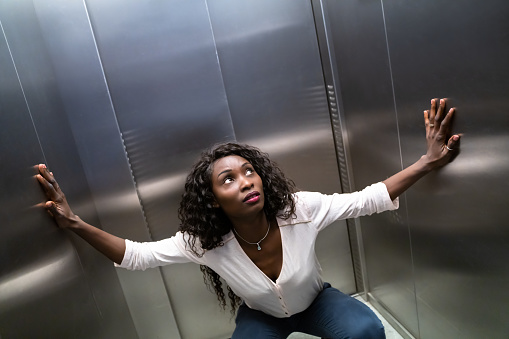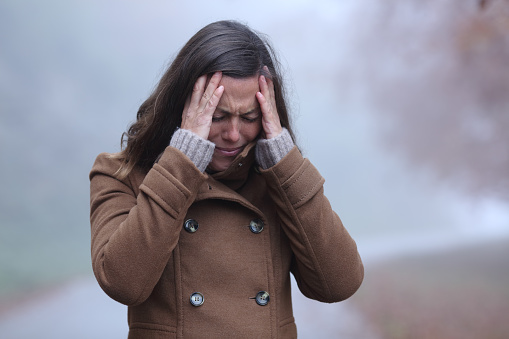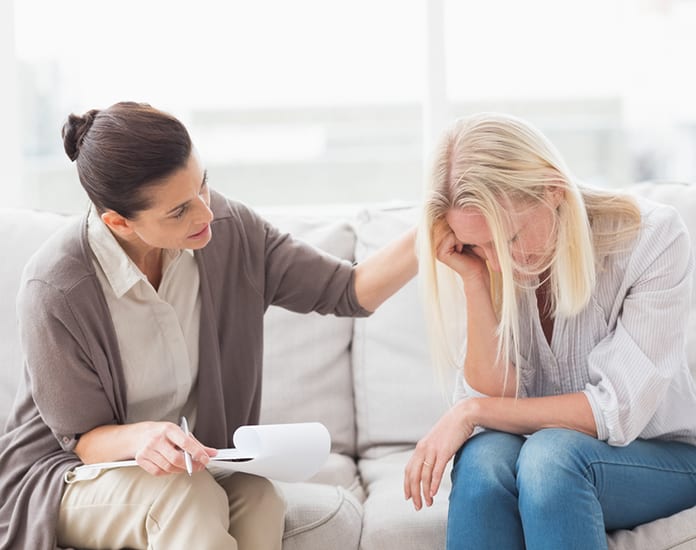
Agoraphobia is a fear of being in places or situations from which it is difficult to escape. It manifests itself as a recurrent and unexpected fear of being in public or open spaces or situations from which it is difficult to escape. It can be triggered by various situations or events, such as being alone, being in an unfamiliar place, being around people you don’t know, or being in situations where there are a lot of people.
The word agoraphobia means “fear of the marketplace.” People with agoraphobia fear being in situations from which it is difficult to escape. They often avoid places where they feel this fear, like shopping malls, grocery stores, large retail centers, and other public places.
Agoraphobia is a type of anxiety disorder that manifests itself as recurrent and unexpected fear of being in public or open spaces or situations from which it is difficult to escape. It can be triggered by various situations or events, such as being alone, being in an unfamiliar place, being around people you don’t know, or being in situations where there are a lot of people.
Contents
What is agoraphobia?
Agoraphobia is a type of anxiety disorder that causes sufferers to avoid high-risk places or situations. In other words, it’s a fear of being in places where escape would be difficult or help wouldn’t be available if the person becomes overwhelmed by anxiety.
Agoraphobia is often confused with claustrophobia, which is the fear of being enclosed in an area that doesn’t have any way out. But agoraphobia isn’t just about feeling trapped; it’s more about feeling endangered. Sufferers might worry that they’ll panic and not be able to get away from whatever is scaring them.
Symptoms of agoraphobia can vary from one person to another, but there are some common symptoms people experience, including:
- Panic attacks
- Nausea
- Dizziness
- Muscle tension
- Shivering
- Sweating -Rapid heartbeat
- Breathlessness
- Chest pain
- Trouble swallowing
- Vomiting
Causes of Agoraphobia
Agoraphobia is caused by a number of different factors. One of these factors is depression, as many people with depression develop agoraphobia. Depression can cause sufferers to limit their activities because they believe they are unable to cope with their negative thoughts and feelings. Other phobias, such as claustrophobia and social phobia, can also lead to agoraphobia.
Sometimes people will have an anxiety disorder such as generalized anxiety disorder or obsessive-compulsive disorder that develops into agoraphobia. They may have a history of physical or sexual abuse or substance abuse problems which could lead to the development of agoraphobia. A family history of agoraphobia or a traumatic experience may also be a factor in developing this condition.
Symptoms of Agoraphobia

Agoraphobia is a common anxiety disorder that affects an estimated 7.7 million Americans. It is characterized by the fear of being in places where escape might be difficult or help wouldn’t be available if things go wrong. The most common situations that trigger this fear are open spaces, crowded public places, and traveling alone. Agoraphobia can also lead to social isolation due to avoidance of these situations.
Agoraphobia can make you feel trapped, helpless, and as if you are always in danger. The symptoms of agoraphobia vary among sufferers but the common denominator is their fear of being outside the safe zone. Some of the most common symptoms of agoraphobia include:
- Rapid heartbeat (tachycardia)
- Rapid breathing (hyperventilating)
- Feeling hot and sweaty (flushing)
- Feeling sick (nausea)
- Chest pain
- Difficulty swallowing (dysphagia)
- Diarrhea
- Trembling
- Dizziness
- Nausea or vomiting
Treatment of Agoraphobia
It’s important to note that not all treatments for agoraphobia are the same. Your treatment plan will be tailored to your specific needs and what helps you the most. Some of the more common treatments for agoraphobia are antidepressants called selective serotonin reuptake inhibitors (SSRIs) and SSRI antidepressants, such as fluoxetine (Prozac) and sertraline (Zoloft).
These medications help by increasing the serotonin levels in your brain. Your doctor might also recommend that you try a benzodiazepine like alprazolam or clonazepam to help with anxiety.
There are many different ways to treat agoraphobia. You can start by trying not to avoid situations where you fear being trapped or having no escape routes. You might also work on relaxing skills, avoiding alcohol, recreational drugs, and tobacco which could worsen symptoms.
Taking care of yourself as well as getting support from friends and family can be helpful too. Some people find it helpful to join a support group for people who suffer from anxiety disorders like agoraphobia.
Lastly, there are various medications your doctor may prescribe such as antidepressants such as selective serotonin reuptake inhibitors or SSRIs or benzodiazepines such as alprazolam or clonazepam at low doses to decrease the intensity of symptoms.
Is Agoraphobia Treatable?

Agoraphobia can be a difficult condition to overcome. However, it is a treatable condition. There are several treatment plans for agoraphobia. The most common treatments include cognitive behavioral therapy, psychotherapy, and antidepressants.
Cognitive-behavioral therapy is often used as an initial treatment plan because the focus is on the present situation and not the past. It teaches you skills that help you cope with daily life activities in order to gradually face your fears.
Psychotherapy treats mental health conditions such as anxiety, depression, or other mood disorders. Antidepressants work by affecting the balance of chemicals in your brain which typically leads to a calmer state of mind and fewer anxiety attacks.
The key to overcoming agoraphobia is building up your courage and confidence in order to gradually face your fears. Medication can also be helpful when used alongside therapy or counseling sessions so that you have more long-lasting effects of conquering your phobia symptoms.
What does agoraphobia look like?
Agoraphobia is a fear of being outside the safe zone and being in an open space. As a result, sufferers can have anxiety attacks when they are away from their safe zone. Symptoms of agoraphobia include feelings of extreme fear or dread, muscle tension, nausea, dizziness, and more.
The severity of anxiety experienced by someone with agoraphobia usually depends on how frequently the symptoms occur and how difficult it is for them to leave the safe zone.
Agoraphobia can be caused by many things including genetics, viral infections like Zika and other natural disasters like earthquakes or floods. Treatment options depend on what caused the agoraphobia but typically include medication as well as therapy sessions.
What triggers agoraphobia?
Agoraphobia can be triggered by a number of different factors. For example, it can be triggered by a traumatic event such as being in an accident or witnessing a violent crime.
It can also be triggered by panic attacks that occurred in certain places and associating those places with the panic attacks. In other cases, it might be caused by the sufferer’s negative beliefs about themselves or the world around them.
Every person has their own set of things that triggers agoraphobia for them, but there are some common triggers that are more universal than others:
Can you suddenly develop agoraphobia?
Some people can develop symptoms of agoraphobia even though they don’t have a history of panic disorder or panic attacks. Others with a history of panic disorder might have a sudden increase in agoraphobia symptoms. One of the common causes of agoraphobia is witnessing or experiencing an event that you find traumatic.
Another cause is genetics. It can be inherited from family members who also suffer from agoraphobia. Usually, the trauma or event that triggers agoraphobia will vary depending on the person’s experience and genetics.
If you think you might have agoraphobia, then it’s important to speak to a medical professional about your condition. Agoraphobia can be treated with psychotherapy and medication.
How do I know if I have agoraphobia?
To make sure, see if you avoid any place or situation where there is little to no escape route. You might also experience nausea, dizziness, muscle tension, shivering, sweating, a rapid heartbeat, breathlessness, chest pain, trouble swallowing, and vomiting if you have severe cases of agoraphobia.
Does agoraphobia ever go away?
Approximately a third of people with agoraphobia will eventually get a complete cure and remain free from symptoms forever. For some people, their symptoms improve or go away. For others, the condition is chronic and never goes away.
The best way to avoid the feeling of being trapped is by addressing the underlying factors that cause it in the first place.
What is the fastest way to cure agoraphobia?

Exercise not only helps you to lose weight, but it also has a wide range of other benefits on your physical and mental health. Exercise is an excellent way to improve your mood and lessen the symptoms of depression.
This is because exercise increases serotonin and dopamine levels in the brain which makes you feel better about yourself. It also releases endorphins which make you feel happier and less anxious. Additionally, exercise reduces stress hormones that cause muscle tension, headaches, and stomach problems as well as raising your pain threshold.
It would be impossible to list all the benefits of exercise here but there are many reasons why it should be part of any treatment plan for agoraphobia. In addition to reducing the risk of heart disease, stroke, cancer and diabetes-it also helps people with anxiety disorders like agoraphobia.
A study found that 60% of patients who exercised regularly experienced significant improvement in their condition while only 16% who didn’t were helped at all by their prescribed treatment plan.
The fastest way to cure agoraphobia? Exercise!
How long does it take to get over agoraphobia?
If agoraphobia is left untreated, it can last for years or even a lifetime. However, the sooner you get help for your phobia, the easier it is to overcome.
Although it can take years for symptoms of agoraphobia to go away, with treatment and guidance, it’s possible to overcome the disorder. If left untreated, an anxiety disorder like agoraphobia can last a lifetime.
The sooner you get help, the easier it will be to overcome your phobia. There are many different treatments available such as medications, cognitive behavioral therapy (CBT), and exposure therapy. Thankfully there is hope for those who suffer from agoraphobia and it is possible to have a healthy and happy life free from this fear.
What happens if agoraphobia is left untreated?
If agoraphobia is left untreated, it can lead to depression. The longer you stay without managing it, the higher the risk. Moreover, since it can last for a lifetime when left untreated it puts you at risk of other conditions including suicidal thoughts.
It can be hard to treat agoraphobia on your own because it’s an anxiety disorder and people with this condition are often ashamed of their fear. It can be a difficult disorder to diagnose depending on the severity of the symptoms or if it is situational or not. There are treatments, however, that have shown to be effective for overcoming agoraphobia.
Counseling is one of the most common ways many sufferers overcome agoraphobia. This form of therapy has helped many sufferers conquer their fears by teaching them how to cope with panic attacks and other symptoms. Another helpful treatment for those with mild cases of agoraphobia is relaxation techniques and behavioral therapy. These methods are usually combined with counseling as well for best results. If you find that you have strong feelings about suicide, please get help and talk to a professional immediately.
What famous person has agoraphobia?
One of the most famous people to have agoraphobia is Barbara Streisand. The singer has a fear of crowds which has impacted her career and life. When she does go out, she reportedly brings her own food with her for fear of getting sick from restaurant food.

The best way to combat agoraphobia is through cognitive therapy with a therapist who can teach you how to resist your anxiety responses. You can also combat it by facing your fears in a safe environment such as your home or yard. You might also choose to undergo hypnotherapy, which aims to cure your problem by using a form of therapy that induces relaxation.
How do you help someone with agoraphobia?
– The most effective way to help a friend or family member with agoraphobia is to learn more about it and be patient. Do not trivialize their feelings or experiences because they are very real and very frightening.
– Help your friend create an anxiety plan and become a support system for them. Encourage them to seek professional treatment if you feel like things are getting worse. Regularly check in with your friend and encourage them to stay on the same path towards recovery.
Does agoraphobia cause nausea?
Agoraphobia can cause nausea, a rapid heartbeat, and other symptoms of panic attacks. This is because when a person with agoraphobia experiences a stressful situation, the body’s natural defense mechanisms kick in.
For example, if the individual feels trapped or confined, the body will produce chemicals that will make them feel nauseous, dizzy, and lightheaded. In some cases, people experience breathlessness, chest pain or trouble swallowing when they are in stressful situations with agoraphobia. It also presents as panic attacks such as a rapid heartbeat and nausea.
Can I get disability for agoraphobia?
You can qualify for disability due to agoraphobia. You need to have a doctor who has been helping you with your mental illness and can prove that you are disabled. Then, you will get benefits from Social Security. These benefits will help in paying for the expenses of living with agoraphobia.
However, it is important to note that Social Security does not cover all of the expenses that come with living with agoraphobia. There are other programs that can provide assistance, such as the Supplemental Security Income program or the Veterans Administration.
Conclusion
Agoraphobia is a fear of being outside of a person’s safe zone and being within an open space. It can be an extreme form of anxiety that makes a person avoid going out and being with others.
Agoraphobia can make you feel trapped, helpless, and as if you are always in danger. The symptoms of agoraphobia vary among sufferers but the common denominator is their fear of being outside the safe zone. Some of the most common symptoms of agoraphobia include:
The symptoms of agoraphobia can manifest in a variety of ways. You might experience mild or severe forms of anxiety and panic attacks. You might also experience nausea, dizziness, muscle tension, shivering, sweating, and a rapid heartbeat. In extreme cases, you might also experience breathlessness, chest pain, trouble swallowing, and vomiting.
The severity of agoraphobia is usually determined by how frequent the symptoms are and how much difficulty you have going out. Some sufferers can experience agoraphobia at any point in their life, while others can only experience it in certain situations.
Agoraphobia is a complicated condition that can stem from a variety of causes. It could be caused by an environmental trigger, or it can be genetic in origin. Agoraphobia is a scary disorder to experience and can affect your life in many negative ways. Treatment for agoraphobia varies depending on the cause but it usually involves taking medication and going through therapy. If you think you might have agoraphobia, it’s important to talk to your doctor about treatment options.
FAQs
What are the causes of agoraphobia?
The exact reason for someone to develop agoraphobia is unknown. Some psychotherapists believe that it may be caused by a traumatic experience or even a genetic predisposition.
How do I know if I have agoraphobia?
If you’ve been experiencing symptoms of anxiety and panic attacks, then you may have some form of agoraphobia. Symptoms can vary from person to person so it’s important to talk with your doctor if you think you might have this condition.
Does agoraphobia cause insomnia?
Yes, GAD, agoraphobia with panic attacks frequently also suffer from insomnia.
What are some causes of agoraphobia?
The majority of people who suffer from this disorder have experienced traumatic events in their lives such as sexual abuse or physical abuse. Other major causes may be accidents or natural disasters which has caused them to feel like they are always in danger and need help all the time. The cause for the overwhelming majority of people with this issue is usually linked to childhood trauma. Most sufferers were abused by an adult when they were children which has caused them to feel unsafe going out into society today as adults.
What does it mean to have agoraphobia?
Agoraphobia means that you cannot leave the house without having a panic attack or without feeling intense anxiety. It can also mean that you are so scared of someone or something that you will not go out of your home.
What is agoraphobia?
Agoraphobia is a fear of being outside of your safe zone and being in an open space. It can be an extreme form of anxiety that makes a person avoid going out and being with others.
